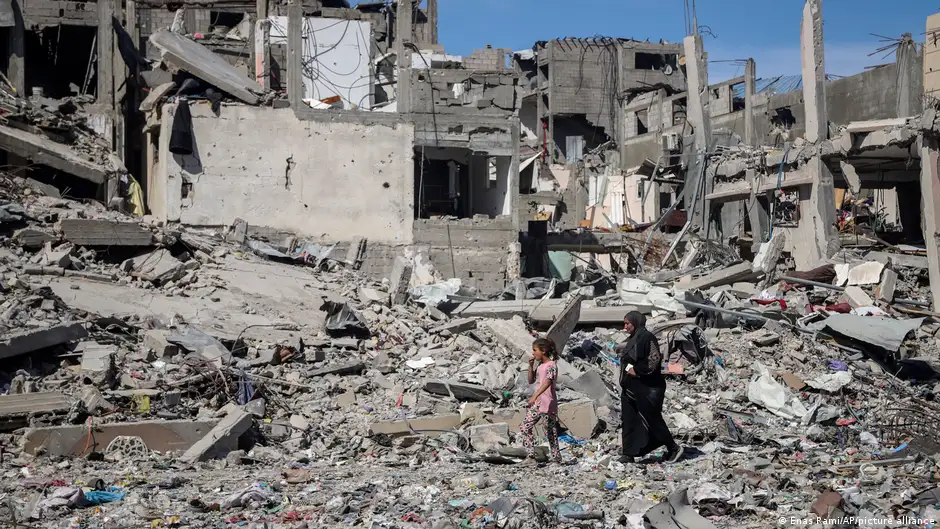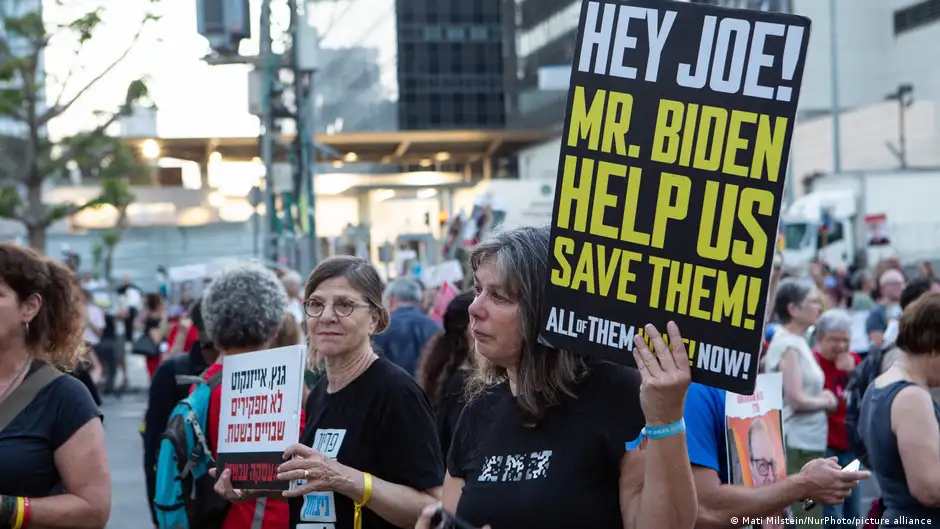What Gaza exit strategy?

Where is the exit and, most importantly, how do we get there? Right now, this is the most virulent of the questions surrounding the Israeli offensive in Gaza.
Even if the latest ceasefire proposal from U.S. President Joe Biden actually takes shape and is accepted by both Israel and Hamas, one major question remains unanswered: what happens when those three suggested phases are implemented, the guns fall silent, Israeli hostages and Palestinian prisoners in Israeli prisons are exchanged, the Israeli army actually leaves the Gaza Strip and the rebuilding begins? Who will govern, and who will ensure security there?
From the side of Israel's prime minister, Benjamin Netanyahu, the talk is still of eliminating Hamas. President Biden has lowered the bar in an attempt to make the new ceasefire proposal palatable to Netanyahu, and is saying that Israel has managed to destroy Hamas's capacities to such an extent that another October 7 is no longer possible.

Israel's unrealistic aim
One thing is clear. If Israel agrees to the deal, then it will have given up its original aim in this war, to destroy Hamas. This, in any case, was unrealistic from the outset. According to a report by Politico last month based on information from the U.S. secret services, by that point no more than a third of the Hamas fighters who had been active since October 7 had been killed, while 65 percent of the tunnels used by Hamas were still intact. Hamas, it said, has recruited a thousand new fighters in the past seven months.
Originally, Netanyahu also justified his military offensive against Rafah by saying he wanted to wipe out the "final four" Hamas brigades there. It was basically supposed to be the last card he would play in the Israeli military offensive in Gaza.
But so far all it has done, according to UN figures, is drive a million people out of Rafah, fleeing the fighting yet again. Instead of destroying Hamas once and for all in Rafah, the Israeli army once more became bogged down in battles with Hamas in the Jabaliya refugee camp in the north of the Gaza Strip.
This sparked some of the fiercest fighting since the start of the war, in a territory that the Israeli army declared to be "under control" months ago. Meanwhile, the Israeli army has retreated from the area yet again. It is just a matter of time before Hamas moves back in. The Israeli army's many attempts to destroy Hamas are like someone trying to bail out a leaky boat.

Post-war plans
The main problem is something that happens to many military forces. They are sent into a war by politicians, report great initial successes, and then the politicians have no exit strategy for them.
The U.S. military was forced to learn this lesson in Iraq and, most recently, painfully in Afghanistan. Israel has found itself in this plight once before, in the 2006 war against Hezbollah in Lebanon. The all-powerful Israeli army was unable to defeat the Shia Hezbollah, which has shared power in Beirut ever since. And now, the Israeli army is reaching this point once again.
The wildest plans are circulating for the post-war period. There has been some talk of a private security company (read: mercenaries) taking over the Rafah border crossing, for example. Then the idea has been discussed of an EU mission taking on this task at the border crossing, though it remains entirely unclear who the Palestinian partners would be in this scenario.
Reports in the Israeli media have also been saying that it is not the Palestinian Authority in the West Bank (PA) that should take control of the whole Gaza Strip, but an undefined group of Palestinians who should have no links to Hamas. The PA should play an unofficial role in this at most, which is something they have already rejected.
How to fill the power vacuum?
Then there has also been talk of an international or Arab peacekeeping force that should fill the power vacuum in Gaza post-Hamas.
All these scenarios have one major catch. So far, neither Netanyahu nor his rival in the war cabinet Benny Gantz, nor defence minister Galant want to give up Israeli security control over the Gaza Strip.
In their minds, the territory should continue to be cut off from the rest of the world. Israel wants to retain control not only of everything that goes in and out of Gaza, but of the airspace above it and the sea on the other side. In short: it wants to maintain the status quo that failed to guarantee Israel's safety before the war, as the bloody events of October 7 brought home so painfully to all Israelis.
In addition, the Israeli Netzarim security corridor in the centre of the Gaza Strip has now been finished. This is a swathe cut through from the Israeli border to the Mediterranean Sea, splitting Gaza into a northern and a southern part and giving the Israeli army quick access to both.
Depending on the conditions imposed, the Israeli army wants to retain the right to carry out further military raids, or even bombardments. In other words, the Israeli occupation of the Gaza Strip is to continue even after a ceasefire deal is completed.

An economy of disparities
In his book "The Political Economy of Israel's Occupation", the Israeli economist Shir Hever analyses the relationship between the economy and Israel's occupation of the Palestinian territories and its global impact. Martina Sabra read the book and spoke with the author
No peace-keepers in sight
But under these conditions, no one, be they non-Hamas-affiliated Palestinians or the Palestinian Authority – or indeed an Arab or international peacekeeping troop – will stoop to playing Israel's policeman in Gaza.
Because what would happen next is easy to predict. Whoever took on this role would be seen by the Palestinians in Gaza, whether supporters or opponents of Hamas, as collaborators with the Israeli occupation.
In interview last month with the American television network CBS, U.S. foreign minister Antony Blinken said that the USA had been working for many weeks to come up with a credible plan for the post-war period in Gaza, until a non-Hamas security apparatus has been created. The Financial Times reports that the USA has evidently been in talks with some Arab states about a potential Arab peacekeeping force in Gaza to fill the security vacuum following the end of the war there.
The newspaper cites conversations with unnamed western and Arab officials. Egypt, the United Arab Emirates and Morocco, it says, are considering participation in an Arab peacekeeping force. Saudi Arabia is said to have declined immediately.
But these talks can have been no more than exploratory conversations, because so far none of the Arab countries has given an official confirmation or had an official discussion on the matter.
Two-state solution: the only real exit strategy
The whole thing seems to have gone no further than a non-binding thought experiment, and is at most a weathervane. And even then, the anonymous Arab partners in these talks have clearly stipulated that Arab participation in a potential peacekeeping force would only be conceivable if it came with irreversible measures towards a two-state solution.
And then we are back to square one, since a potential Palestinian state in the Gaza Strip and parts of the West Bank is something that Netanyahu, and the majority of the Israeli population along with him, categorically rejects.
And so, in the end, all the post-war ideas are non-starters. The fact remains that large parts of the Gaza Strip may have been destroyed, but Hamas has not. And the realisation is slowly dawning that the Israeli occupation and total Israeli security control is likely to continue – and with it, instability not only for Israelis and Palestinians, but for the whole region. In the end, no clear-thinking person can believe that the security and military mess in Gaza can be sorted out after the war under the current conditions.
The only real exit strategy is to reach an international agreement with Israel, with Palestinian involvement, to set up a workable two-state solution, and to clearly define the route and the timeframe for getting there.
As a guarantee, the notion of a Palestinian state would first have to be recognised internationally. Only when this aim is set with international guarantees can serious and achievable interim solutions for the Gaza Strip be considered, in which those involved do not gain a reputation for just being the long arm of the Israeli occupation. Because this, as we have seen over the past few months, offers no security to either Palestinians or Israelis.
© Qantara.de 2024
Translated from the German by Ruth Martin
